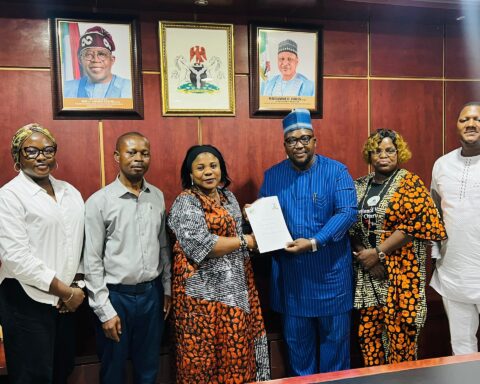The Federal Government of Nigeria has reiterated its resolve to fully implement regulations aimed at ensuring environmentally sound management of all types of batteries throughout their life cycle – from production, usage, collection, transportation, storage, recycling to disposal.
The Minister of Environment, Mallam Balarabe Abbas Lawal, who gave this assurance on Thursday (yesterday, August 29) at the official launching of the National Environmental (Battery Control) Regulations 2024, said the event, organized by the National Environmental Standards and Regulations Enforcement Agency (NESREA), with the support of the Nigerian Energy Support Programme (NESP), a technical assistance programme co-funded by the European Union and the German Government and implemented by the Deutsche Gesellschaft fur Internationale Zunsammenbeit (GIZ) GmbH and Heinrich Boll Stiftung, is to address the challenges of waste battery management in Nigeria.
The Minister said, “I am here today to formally present the National Environmental (Battery Control) Regulations to the general public and key stakeholders. These Regulations aim to ensure the environmentally sound management of all types of batteries throughout their life cycle, from production, usage, collection, transportation, storage, recycling, and disposal.
“It is widely recognized that batteries, particularly those used in renewable energy, telecommunication, and automotive sectors, are critical to Nigeria’s economic development. However, the improper handling, that is, collection, recycling, and disposal of used batteries present serious environmental and health challenges.”
The Minister said that the informal sector, which often handles waste batteries without regulation, significantly contributes to environmental pollution, including soil, air, and water contamination, warning that batteries contain hazardous materials such as lead, mercury, cadmium and lithium, amongst others, which when improperly disposed of, could lead to severe health conditions, including cancer, kidney damage, and neurological disorders.
Worse still, vulnerable populations, particularly children, face the greatest risk from exposure to these toxic substances, the Minister added, insisting that the unregulated activities of battery recycling facilities and handlers have impacted negatively on both human health and the environment.
“Ecosystems around these battery recycling facilities have been polluted and waste lead is often dumped indiscriminately in unauthorized locations without proper permits. These practices, therefore, must be curbed urgently,” he said.
“As you may be aware, Nigeria is a signatory to international conventions, treaties, and agreements such as the Basel Convention on the Control of Transboundary Movements of Hazardous Wastes and their Disposal and the Bamako Convention on the Ban of the Import into Africa and the Control of Transboundary Movement and Management of Hazardous Wastes within Africa.
“In line with our commitments under the Convention, the Federal Ministry of Environment developed and launched the National Policy on Waste Battery Management in 2022, aligning our practices with global standards for the safe handling, recycling, and disposal of used batteries. The newly launched Regulations thus provide the necessary legal framework to enforce compliance and ensure that Nigeria continues to protect both the environment and public health.
“The National Environmental (Battery Control) Regulations specifically tackle the challenges posed by informal recyclers and unregulated battery collection, recycling, and disposal practices. These Regulations seek to formalize the battery recycling sector, promote safe disposal methods, minimize environmental pollution, and promote the implementation of the Extended Producer Responsibility (EPR) program for the battery sector in Nigeria.
“The EPR Programme mandates that producers take responsibility for the entire life cycle of their products and also mandates that producers, collectors, and recyclers work with the Producer Responsibility Organization (PRO), the Alliance for Responsible Battery Recycling (ARBR) to ensure environmentally sound collection, transportation, storage and recycling of used batteries.



























